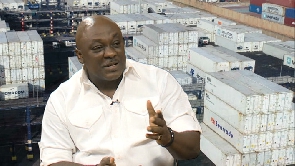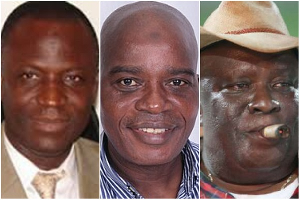A Deputy Minister of Trade and Industry, Carlos Ahenkorah, has maintained the resolve of government to implement the new Integrated Customs Management System (ICUMS) to enable the country achieve its single window objectives stating a 30% projected revenue increase when ICUMS is fully deployed.
“UNIPASS from the word go is going to improve our revenue collection by 30%,” he said.
Speaking on an Eye on Port discussion on the Implementation of ICUMS, and the Future of Ghana’s Single Window Goals, the Deputy Minister in charge of Trade argued that the existing vendors of GCNet and West Blue, do not only defy the country’s objective of a single window, but were responsible for some revenue losses, upon the assessment of government.
“Because the two systems were not configured to meet each other’s’ aspirations there were loopholes that people could take advantage of, and that is a fact,” he stated.
He also cited that “a car clearance came with a CCVR from Customs which made people pay Ghana cedis 5,000 for a brand new range rover.”
This according to the Deputy Minister, informed the need for government to introduce, a tried and tested UNIPASS technology used by Korea customs in order to achieve its trade facilitation and revenue mobilization ambitions.
“The UNIPASS system has no challenges. This is not the first place that UNIPASS is deployed. UNIPASS Korea should tell you that Korea has been using it for many years. Aside that there are about 5 other countries in Africa that are using it,” he indicated.
Carlos Ahenkorah explained why the UNIPASS System would portray the intended vision of Government’s single window objectives.
“You have a system today that is shortening the process. You open one front end, you do your UCR, you will do your IDF, you input your declaration, customs come back with the duty you have to pay, you pay that duty online, and once shipping lines are paid, you can go pick up your cargo.”
He also disclosed that the problem of compliance which was not fully eliminated by the existing customs management system has been resolved by the new Integrated Customs Management System.
Emmanuel Ohene, an Assistant Commissioner of Customs, and the Head of the Implementation team of ICUMS, on the same program, also listed some benefits the ICUMS would bring to the sea trade including improved risk management and valuation.
“Another feature you can talk about is the enhanced risk management now has a feedback into the ICUMS so when an infraction is detected, a remedial measure is easily dispensed as a result. These are some of the initiatives that you did not find in the existing setup where we had difficulty getting infractions reported back.”
The Assistant Commissioner, who is the Sector Commander of the Accra Collection of Customs, also said the new ICUMS is more user friendly that has improved the benchmarks set by the existing vendors.
“The current vendors have developed some benchmarks that are worthy of mention. But I can tell you that the process flow of ICUMS is quite straightforward. You submit your documents and there is no need for you to have a classification and valuation report. Immediately after the processing of the valuation, you have an assessment.”
He continued, “Now this system has created a port community which hitherto did not exist. In this Port Community, you have terminal operators, the ICD’s, the Shipping Lines all networked in one community where one mistake of the other can easily be detected and corrected at the level of the community.”
The Deputy Minister of Trade and Industry who also doubles as the Member of Parliament for Tema West also explained why the UNIPASS system would save the trading public as well as government more money in comparison to the combination of the existing vendors, GCNet and West Blue.
“This is because the more you have more people on the clearance chain, the more expensive it becomes…At the back end of all this, the ordinary user would be 0.75 %. Because ordinarily they were paying 1% to West blue and 0.40% to GCNet.”
Carlos Ahenkorah appealed to the general trading public to buy into the UNIPASS system and give it time to prove its value with regards to increased trade facilitation and revenue mobilization of the country.
“They should give it a little bit of time, and test this system so that after six months, they can give their opinion,” he said.
Business News of Thursday, 14 May 2020
Source: Eye on Port













